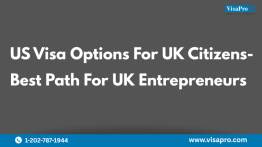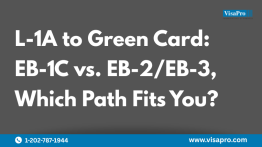Quick Summary:
If your company is offering you a transfer to the U.S. under an L-1 visa, but you’re unsure whether your education qualifies, you’re not alone. Many professionals feel anxious when their degree path isn’t straightforward. This article clears the confusion and explains what really matters for L-1A and L-1B visas, and when a degree is (or isn’t) required.
Understanding When Education Matters For An L-1 Visa Transfer
- There is no general degree requirement for the L-1A visa.
- There is no general degree requirement for the L-1B Visa, unless the applicant is applying under a Blanket Petition.
The U.S. L-1 visa category is designed to allow international companies to transfer key employees to their U.S. branches. While education may be a factor, eligibility actually hinges more on your employment history, role within the company, and the type of visa route (L-1A or L-1B).
- For L-1A (managers/executives): No degree is required.
- For L-1B (specialized knowledge workers): No degree is required unless the company is using an approved Blanket L Petition.
That means you could still qualify even if you didn’t complete your first degree or pursued it years later, as long as you meet the job-related criteria.
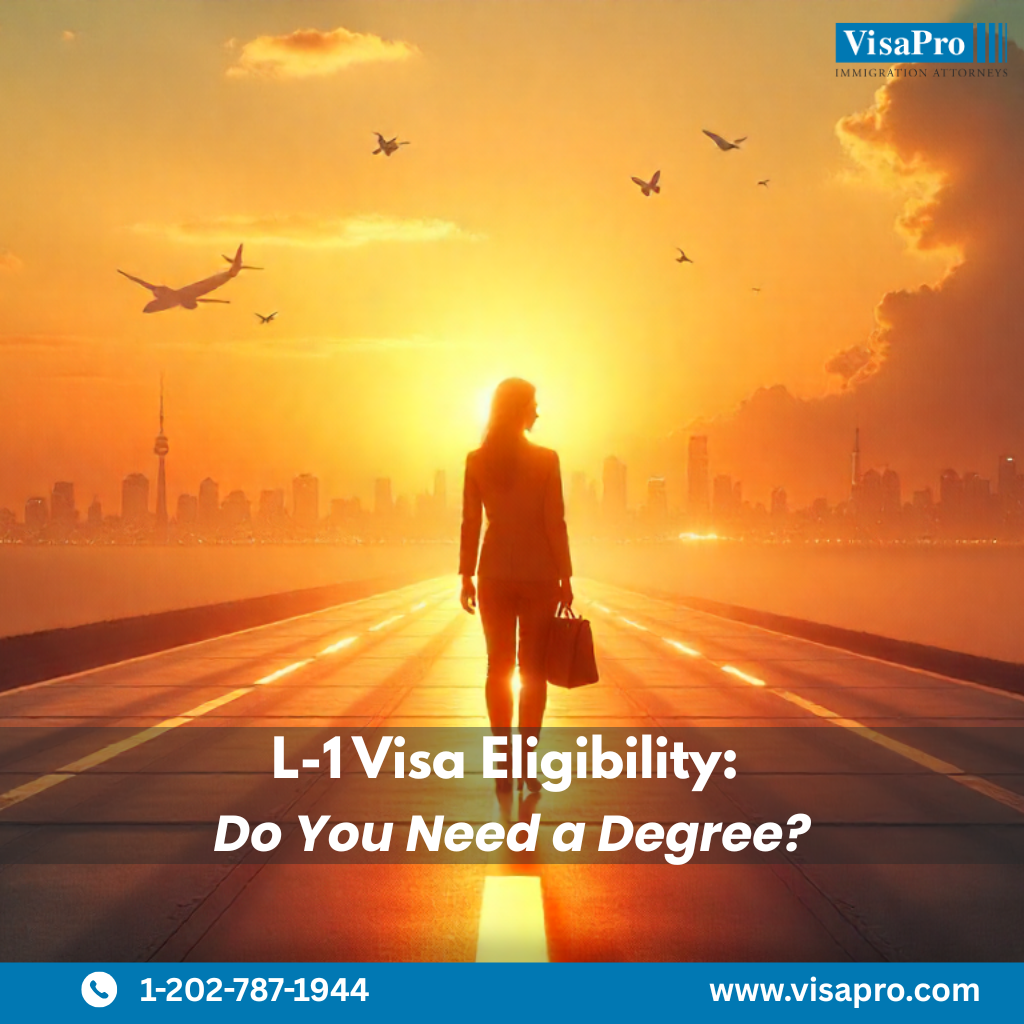
Do You Qualify For L-1A As A Manager Or Executive?
If you’re being transferred to the U.S. to manage a department, project, or team, you likely qualify for the L-1A even without a university degree.
U.S. immigration authorities focus on the nature of your job duties and leadership responsibilities, not your academic history, when evaluating L-1A petitions.
Real-life scenarios:
- Example 1: A Senior IT Manager in Brazil without a formal degree was approved for L-1A because he supervised 10+ employees and managed budgets.
- Example 2: A Sales Director in India who had an unfinished undergraduate degree was transferred under L-1A after leading expansion into new regions.
- Example 3: A Project Manager from Europe overseeing multi-million-dollar client implementations got approved despite holding only a vocational diploma.
Tips:
- Keep organizational charts showing your leadership role.
- Collect evidence of decision-making authority, team supervision, budgets managed, or cross-border projects led.
- Titles matter less than your actual job functions.
Actual Tip: You don’t need a degree for L-1A, but strong documentation of your managerial or executive role is key.
L-1B Under Blanket Petition? A Degree Is Required
To qualify for L-1B under a Blanket L Petition, U.S. regulations require you to be a “professional”, typically proven by having a bachelor’s degree or equivalent.
If your company has an approved Blanket L-1 petition (as many large U.S. employers do), you may be processed more quickly, but only if you meet all the eligibility conditions, including educational qualifications.
- The term “professional” means you have at least a U.S. bachelor’s degree or foreign equivalent.
- This is required only for L-1B under the Blanket route, not for L-1A or regular L-1B petitions.
Practical examples:
- Example 1: An IT analyst with 3 years of experience but no degree was rejected under the Blanket L-1B, but later approved via a regular L-1B petition.
- Example 2: A software architect with a finance IT degree was accepted under the Blanket L-1B process after her employer provided an education equivalency evaluation.
Checklist:
- If using the Blanket Petition route, prepare a diploma and transcript.
- If your degree is non-U.S., consider getting a credential evaluation.
- If you don’t have a degree, consider applying under L-1A or through the regular L-1B process

How Your Work Experience Can Offset Educational Gaps
Your years of specialized experience with the company can often outweigh the need for academic credentials.
U.S. immigration recognizes that practical, on-the-job expertise can be just as valuable as formal education, especially in technology, operations, or leadership roles.
Real-world examples:
- Case 1: A veteran logistics manager who never completed college gained L-1A approval after demonstrating 15 years of senior management experience.
- Case 2: A cybersecurity lead without a degree but with 10 years of experience in proprietary network protocols was approved under regular L-1B.
Actionable tips:
- Provide detailed letters from HR outlining your projects, responsibilities, and years with the company.
- Include training certifications, awards, or internal promotions.
- Highlight experience that shows deep familiarity with proprietary systems or global company procedures.
Tip: Immigration officers assess your real-world impact, not just your classroom history.
Education Equivalency: What Counts As A “Degree”?
If your degree is from outside the U.S. or you completed it later in life, it can still be valid, with proper documentation and evaluation.
Many applicants worry their international degree won’t count or that an incomplete first program disqualifies them. Not true. What matters is whether your final education aligns with U.S. standards.
Key clarifications:
- A completed foreign degree (like your 2001–2003 IT diploma) may qualify if shown to be equivalent to a U.S. bachelor’s.
- You can use third-party credential evaluators.
- Post-graduate programs and certifications add weight, even if optional.
Tip: While having a degree is not required for the L-1A or regular L-1B, presenting educational certificates may help your case.
Should You Choose L-1A or L-1B? What’s Better For Your Career?
If your role involves leading people or projects, L-1A is usually the better option, especially if you lack a formal degree.
Beyond eligibility, choosing the right L-1 type affects your long-term path:
- L-1A: Valid for up to 7 years and leads directly to a Green Card through the EB-1C Multinational Executive category.
- L-1B: Valid for up to 5 years, harder to transition to permanent residency, and stricter on academic qualifications if filed under Blanket.
Tip: If you’re managing teams, budgets, or departments, even if in IT, aim for L-1A.
When To Avoid The Blanket Petition Process
If you lack a formal degree, your employer must file a standard L-1 application.
While Blanket L-1s are fast and convenient, they come with stricter documentation requirements. Choosing the regular petition route allows more flexibility and narrative control.
When to avoid Blanket:
- You don’t have a degree or your degree is unfinished.
- You want to submit detailed supporting documents.
- Your company supports regular L-1 processing.
Tip: A regular L-1 petition allows your lawyer to build a stronger narrative around your work history and leadership value.
Conclusion: You May Be More Qualified Than You Think
Your journey may include stops and starts in education, but that doesn’t disqualify you from pursuing your dream of working in the U.S. under an L-1 visa. What matters most is the value you bring to your company and the leadership or specialized knowledge you hold.
Ready to explore your L-1 visa options? Our team at VisaPro has helped thousands of professionals just like you navigate the process with confidence. Contact us today or request a free L-1 assessment and find out exactly where you stand.
Frequently Asked Questions (FAQs)
1.Do I need a bachelor’s degree to qualify for an L-1 visa?
Generally, no, a bachelor’s degree is not required for an L-1 visa. However, a a degree is required if you’re applying for L-1B under a Blanket Petition and must meet “professional” status.
2.Can I get an L-1 visa without a degree?
Yes, you can get an L-1 visa without a degree, including for L-1A managerial or executive positions. Even L-1B may be possible without a degree if processed through a regular (non-Blanket) petition.
3.What are the L-1B visa education eligibility criteria?
For L-1B under a Blanket Petition, you must show that you are a “professional,” typically through a bachelor’s degree. For non-Blanket L-1B, education is not mandatory, but experience and specialized knowledge must be well documented.
4.Will my international degree count for an L-1 visa?
Yes, international degrees can count if evaluated to be equivalent to a U.S. bachelor’s degree. Credential evaluations by authorized services can help establish this.
5.Should I apply for L-1A or L-1B if I’m managing IT teams?
If you manage people, budgets, or strategic initiatives, L-1A may be a better fit, especially since it avoids education requirements and offers a more direct path to a Green Card.
What VisaPro Customers Are Saying
The US [B-1] Visa has always been a tough ride, and being denied a few times it makes it even worse. But thanks to VisaPro and their meticulous processing I was granted a Visa. I would like to thank you and all the people involved in making this a success. I would like to recommend VisaPro to all those who seek peace of mind and hassle free Visa processing.”
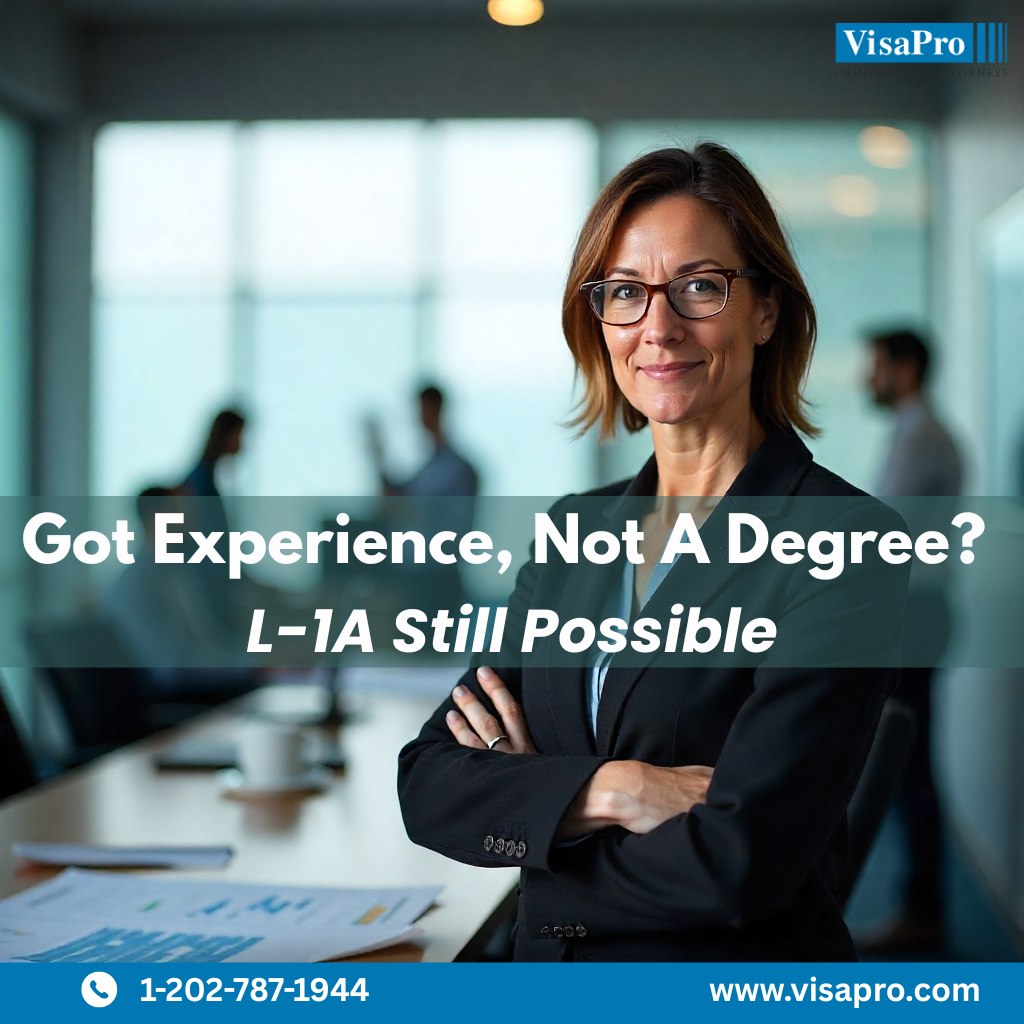
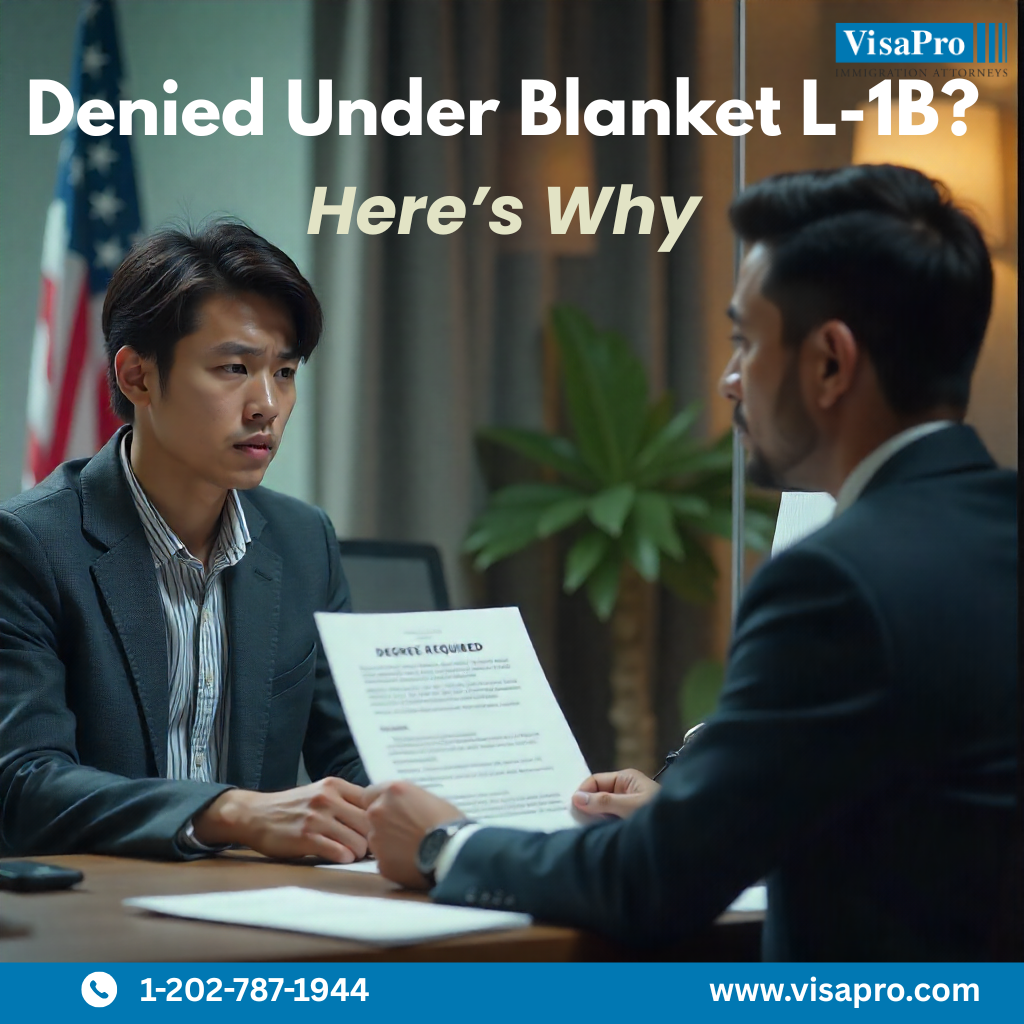
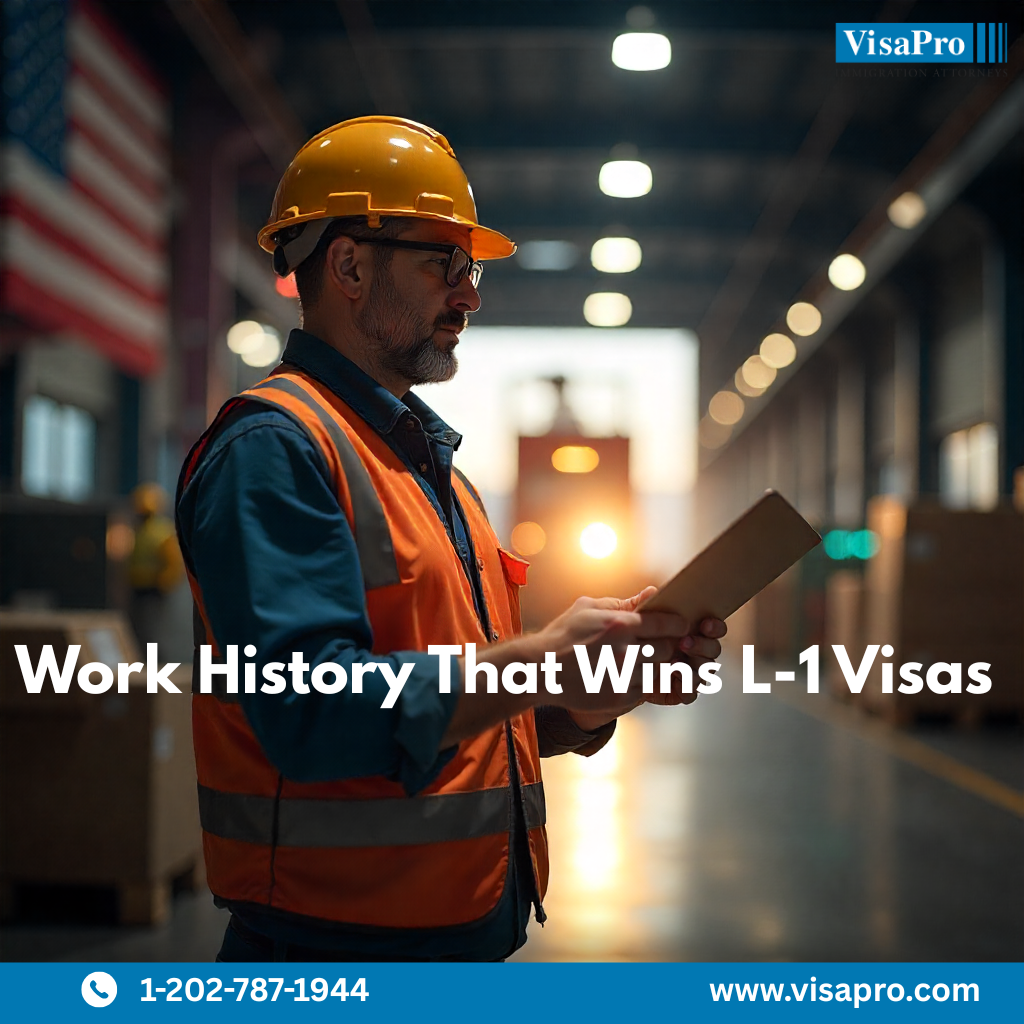
 Manas Bhat, Director Operations, First Houston Mortgage India
Manas Bhat, Director Operations, First Houston Mortgage India
